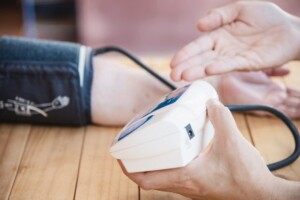
What are the symptoms of LOW blood pressure, how dangerous is this and how is it treated?
“Many people have ‘low’ blood pressure and are perfectly healthy,” says Susan L. Besser, MD, with Mercy Medical Center, Baltimore; Diplomate, American Board of Obesity Medicine and board certified by the American Board of Family Medicine.
“Assuming there is no reason for sudden low blood pressure — like dehydration, trauma, severe medical illness [e.g., right-sided heart failure] — if you are not having any symptoms, there is no need to be concerned about it.
“The most common symptom is fainting when you change position (like from lying down to standing).
“The treatment is to be sure you are well-hydrated and to add some salt to your diet (salt makes your blood pressure go up).” But don’t go overboard on the salt/sodium, either.
“There are prescription medications also, but you must talk with your doctor about that.”
Symptoms of Persistent Hypotension
In addition to dizziness or feeling light in the head, the suffer may experience any of the following: fatigue, blurred vision, nausea, trouble concentrating and even passing out.
The symptoms of a sudden drop in blood pressure can be caused by other conditions, but they are:
- Altered mental status, confusion or the appearance of being “totally out of it,” especially in the elderly
- Cold, clammy or moist skin
- Rapid shallow breathing
- Rapid weak pulse
This is a life threatening situation. The body is not getting enough blood. If the person has a pre-existing condition, namely chronic heart failure, a sudden drop in blood pressure is truly an emergency situation.
Many medical conditions and even prescription drugs can drop blood pressure.
The key issue, again, is how the patient feels despite the low blood pressure. For example, in a very fit, athletic individual, a BP reading of 90 over 67 may be normal.
But for an unhealthy, sedentary person whose BP is normally 130 over 80, a sudden drop to 90 over 67 could make them faint or feel ill.
Treatment for Low Blood Pressure
This depends on the cause, which a doctor can determine.
In the event of a more persistent low BP vs. an acute severe drop, the usual treatments include drinking more water, wearing compression stockings and taking a prescribed medication which can boost blood volume.
You should have a home blood pressure device and regularly take readings — after you’ve been sitting relaxed for five minutes.
 Dr. Besser provides comprehensive family care, treating common and acute primary conditions like diabetes and hypertension. Her ongoing approach allows her the opportunity to provide accurate and critical diagnoses of more complex conditions and disorders.
Dr. Besser provides comprehensive family care, treating common and acute primary conditions like diabetes and hypertension. Her ongoing approach allows her the opportunity to provide accurate and critical diagnoses of more complex conditions and disorders.
 Lorra Garrick has been covering medical, fitness and cybersecurity topics for many years, having written thousands of articles for print magazines and websites, including as a ghostwriter. She’s also a former ACE-certified personal trainer.
Lorra Garrick has been covering medical, fitness and cybersecurity topics for many years, having written thousands of articles for print magazines and websites, including as a ghostwriter. She’s also a former ACE-certified personal trainer.
.








































